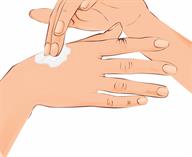Pruritus
Pruritus is an itchy feeling on the skin. One of the most common causes is dry skin, but many different things can cause itching. Most cases of itching do not require medical attention. Sometimes itchy skin can turn into a rash or a secondary infection.
Follow these instructions at home:
Skin care

-
Do not use scented soaps, detergents, perfumes, and cosmetic products. Instead, use gentle, unscented versions of these items.
-
Apply moisturizing creams to your skin frequently, at least twice daily. Apply immediately after bathing while skin is still wet.
- Take medicines or apply medicated creams only as told by your health care provider. This may include:
Corticosteroid cream or topical calcineurin inhibitor.
Anti-itch lotions containing urea, camphor, or menthol.
Oral antihistamines.
-
Do not take hot showers or baths, which can make itching worse. A short, cool shower may help with itching as long as you apply moisturizing lotion after the shower.
-
Apply a cool, wet cloth (cool compress) to the affected areas.
- You may take lukewarm baths with one of the following:
Epsom salts. You can get these at your local pharmacy or grocery store. Follow the instructions on the packaging.
Baking soda. Pour a small amount into the bath as told by your health care provider.
Colloidal oatmeal. You can get this at your local pharmacy or grocery store. Follow the instructions on the packaging.
-
Do not scratch your skin.
General instructions
-
Avoid wearing tight clothes.
- Keep a journal to help find out what is causing your itching. Write down:
What you eat and drink.
What cosmetic products you use.
What soaps or detergents you use.
What you wear, including jewelry.
-
Use a humidifier. This keeps the air moist, which helps to prevent dry skin.
-
Be aware of any changes in your itchiness. Tell your health care provider about any changes.
Contact a health care provider if:
-
The itching does not go away after several days.
-
You notice redness, warmth, or drainage on the skin where you have scratched.
-
You are unusually thirsty or urinating more than normal.
-
Your skin tingles or feels numb.
-
Your skin or the white parts of your eyes turn yellow (jaundice).
-
You feel weak.
- You have any of the following:
Night sweats.
Tiredness (fatigue).
Weight loss.
Abdominal pain.
Summary
-
Pruritus is an itchy feeling on the skin. One of the most common causes is dry skin, but many different conditions and factors can cause itching.
-
Apply moisturizing creams to your skin frequently, at least twice daily. Apply immediately after bathing while skin is still wet.
-
Take medicines or apply medicated creams only as told by your health care provider.
-
Do not take hot showers or baths. Do not use scented soaps, detergents, perfumes, or cosmetic products.
-
Keep a journal to help find out what is causing your itching.
This information is not intended to replace advice given to you by your health care provider. Make sure you discuss any questions you have with your health care provider.
